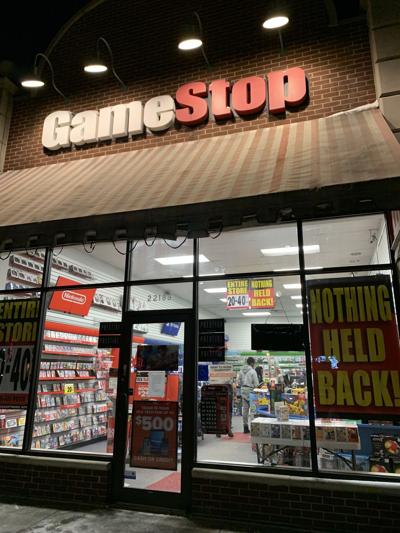When I first heard about investing in Gamestop, I was completely opposed to it. That was last July, right after I watched “The Big Short,” a film based on the people who predicted and profited off the financial crisis of 2007 and the United States housing bubble. I was discussing the plot with my brother, and he mentioned that Michael Burry, an investment fund manager who was one of the first people to predict the housing bubble collapse, had bought three million shares in GameStop. Burry’s justification for his investment was that consumers would still want to purchase consoles and video games in person, even with the transition towards digital distribution throughout the gaming industry. Even though I agreed with Burry’s ideas, I ultimately had no interest in buying GameStop shares because I thought it would go bankrupt due to decreased physical sales during the COVID-19 pandemic.
However, in September GameStop entered my investing news cycle as shares had surged up 52.7% for the month. I read some articles and learned that Ryan Cohen, founder of the e-commerce company Chewy, had purchased a ten percent stake in GameStop. My brother was convinced of the company’s future success since Cohen would be more actively involved in improving GameStop’s digital experience, which had been failing to compete against other retailers. He convinced me to buy call options that expired in December and promised that he would buy me milk tea if his ideas did not work out. Eventually, I saw a 50% return on this investment and closed it in November. I was satisfied with my gains and looked for the next big thing to give me 100% or 200% returns, thinking that GameStop could not grow any further for some time.
Suddenly, on Jan. 15, GameStop shares surged 57% to $35.50 each. I saw previous stocks that rose massively one day and plummeted the next day, so I was wary of purchasing anything relating to GameStop. Later that day, my brother told me about how GameStop was about to go through a short squeeze, which would cause an immense increase in the stock’s price by hundreds of percent. “Shorting” is when an investor borrows a stock from a broker and then immediately sells it, planning to buy the stock back at a cheaper price and gaining profit from the difference. A “short squeeze” is when a stock suddenly rises in value, causing the person shorting the stock to lose money due to their legal obligation to buy back the stock, even at a tremendous loss. I was intrigued by the theory, but still failed to act, thinking the stock was too expensive. Eventually, I bought 14 shares at $40.37 each, as I was afraid of missing out on the short squeeze, but I still worried about any sudden drops in value. With shares, I could just hold for the long-term, so much of the risk would be mitigated unless I got too antsy and sold. At the time, I was sure that I would not buy any more GameStop shares.
On Jan. 22, GameStop was fluctuating from $60 to $80 a share. It was lunch, and there were only 15 minutes left to trade in the stock market. I had just sold some of my investments and had $3,000 I wanted to allocate. My brother was bragging to me about his GameStop shares he bought in December, so I bought two call options for $1,470 each due to the fear of missing out. Call options are contracts that allow the owner to buy a specific number of shares of a company at a specified price within a certain timeframe. Over the next week, Gamestop’s stock rose over 400% due to more retail traders buying shares and multiple hedge funds having to pay for their shorts. The stock peaked at $469.42, 27 times as much as what it was worth a month before. In retrospect, I was only lucky when I chose GameStop, as I could have just as easily lost it all if I timed my investment a week later. Not every stock is going to be like GameStop, so don’t try to time the market and lose money that could majorly affect your finances.
Although making thousands of dollars is fun to hear about, what’s more important is the possible political change that can result from the GameStop mania. To me, the short squeeze not only represents profit, but taking back money from those on Wall Street who regularly manipulate markets. Only one person was convicted after the financial crisis of 2007 and 2008, while the rest of Wall Street was allowed to continue manipulating the markets for their own increase in wealth. The selfish and reckless actions of those at the top disrupted the lives of millions of Americans, destroying retirement savings and forcing many families to lose their homes. Even though the retail investor, a non-professional investor, is only taking a fraction of what Wall Street makes every day, market manipulators still put down any attempt by retail investors to gain meaningful wealth. Whether it be through preventing retail traders from buying GameStop on major online brokerages like Robinhood or trading stocks of GameStop between one another to artificially decrease the price, Wall Street has many tactics to unjustly control the market. Ultimately, the government taking more actions to stop economic injustice matters more than the actual profits I earned.

